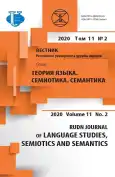Communicative and Emotive Characteristics of the Diplomatic Idiolect
- Authors: Belyakov M.V.1, Maksimenko O.I.2
-
Affiliations:
- Moscow State Institute of International Relations (University) of the Ministry of Foreign Affairs of the Russian Federation (MGIMO University)
- Moscow Region State University (MGOU)
- Issue: Vol 11, No 2 (2020): Semantics of Universal and Specific in the Language and a Text
- Pages: 368-383
- Section: SEMIOTICS OF TEXT AND DISCOURSE
- URL: https://journal-vniispk.ru/2313-2299/article/view/323287
- DOI: https://doi.org/10.22363/2313-2299-2020-11-2-368-383
- ID: 323287
Cite item
Full Text
Abstract
This article is devoted to the study of communicatively conditioned professional idiolect and the emotional speech of a diplomat by means of quantitative computer content analysis and semantic analysis. The characteristics of a professional diplomat’s idiolect, changes in speech that have occurred over time are determined. Particular attention is paid to lexical units, a change in connotations, the degree of overall emotional performance, as well as clichés and aphorisms. The concept of “implicitly emotive diplomatic clichés” is introduced, which is characteristic of the type of discourse under study. According to the results of the study, it is concluded that a professional idiolect is expressed in the skillful switching of speech codes, the rejection of pragmatic appraisal, the ability to explicitly express an appraisal using facts and the exact use of changing connotations, as well as implicitly emotive diplomatic clichés, which allows a diplomat through a “delegated subject” express the country’s attitude to current events, but remain within the framework of the diplomatic speech protocol. The study allows us to come closer to a clearer and deeper understanding of the phenomenon of a professional diplomat’s idiolect as a complex set of speech and textual practices aimed at solving complex international problems in a peaceful way, i.e. verbally. The research material was S.V. Lavrov as the Permanent Representative to the UN Security Council speeches on the theme of ‘peacekeeping’ stored in the Security Council digital archive for 1994-2004, as well as the material of the press conference on 01/17/2020 as the Minister of Foreign Affairs of the Russian Federation.
About the authors
Mikhail V. Belyakov
Moscow State Institute of International Relations (University) of the Ministry of Foreign Affairs of the Russian Federation (MGIMO University)
Author for correspondence.
Email: belmax007@hotmail.com
PHD in Philology, Associated Professor, Associated Professor at Russian Department
76, Vernadskogo ave., Moscow, 119454, Russian FederationOlga I. Maksimenko
Moscow Region State University (MGOU)
Email: maxbel7@yandex.ru
DSc. in Philology, Full Professor, Professor of the Theoretic and Applied Linguistics Department, Linguistic Faculty
10a, Radio street, Moscow, 105005 Russian FederationReferences
- Karasik, V.I. (2016). Discourse manifestation of personality. Russian Journal of Linguistics, 20(4), 56—78. (In Russ.).
- Krasina, E.A. (2016). Discourse, statement and speech act. Russian Journal of Linguistics, 20(4), 91—103. (In Russ.).
- Weber, E.A. (2004). Experience in linguistic research of cognitive dissonance in English diplomatic discourse. Irkutsk: IGLU. (In Russ.).
- Metelitsa, E.V. (2003). Discourse of diplomatic Protocol in English-language ritual communication. Volgograd: VSU. (In Russ.).
- Volkova, T.A. (2007). Diplomatic discourse in the aspect of strategic translation and communication: on the material of English and Russian languages. Tyumen: TSU. (In Russ.).
- Kozheteva, A.S. (2012). Linguopragmatic characteristics of diplomatic discourse based on the material of verbal notes. Moscow: MSPU. (In Russ.).
- Terentii, L.M. (2016). Intentional structure of diplomatic discourse. Moscow: MMA. (In Russ.).
- Novikov, N.V. (2017). Communication strategies of digital diplomacy. Moscow: MSPU. (In Russ).
- Digital Diplomacy: theory and practice (2015). C. Bjola & M. Holmes (Eds.). Rutledge New Diplomacy Studies.
- D’Acquisto, G.A (2017). Linguistic Analysis of Diplomatic Discourse: UN Resolutions on the Question of Palestine. Cambridge Scholars Publishing,
- Torkunov, A.V. et al. (2014). Diplomatic service, A.V. Torkunov (Ed.). (In Russ.).
- Vinogradov, V.A. (2012). Idiolect In Linguistic encyclopedic dictionary. Moscow. P. 171. (In Russ.).
- Halliday, M.A.K. (1978). Language as social semiotic: the social interpretation of language and meaning. London: Arnold.
- Karaulov, Yu.N. & Chulkina, N.L. (2008). Russian language personality: an integrative aspect in the context of intercultural communications. Moscow: RUDN. (In Russ.).
- Shakhovsky, V.I. (1987). Categorization of emotions in the lexical-semantic system of language. Voronezh: VSU. (In Russ.).
- Arutyunova, N.D. (1982). Axiology in the mechanisms of life and language In Problems of structural linguistics. Moscow: Nauka. pp. 5—23 (In Russ.).
- Apresyan, Yu.D. (1974). Lexical semantics. Synonymous means of the language. Moscow: Nauka. (In Russ.).
- Humboldt V. von (1985). Selected works on linguistics. Moscow: Progress. pp. 165—167. (In Russ.).
Supplementary files









